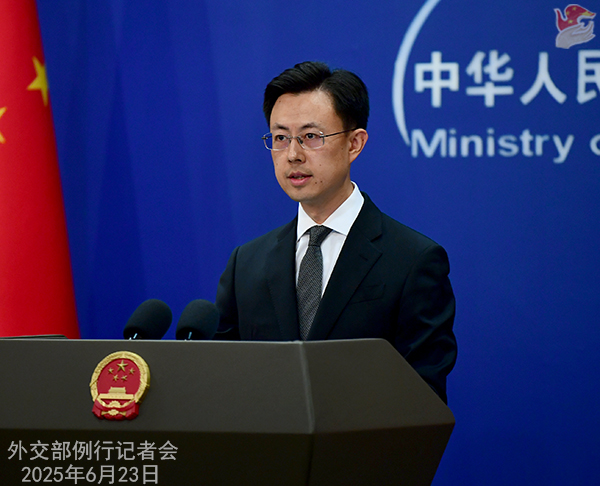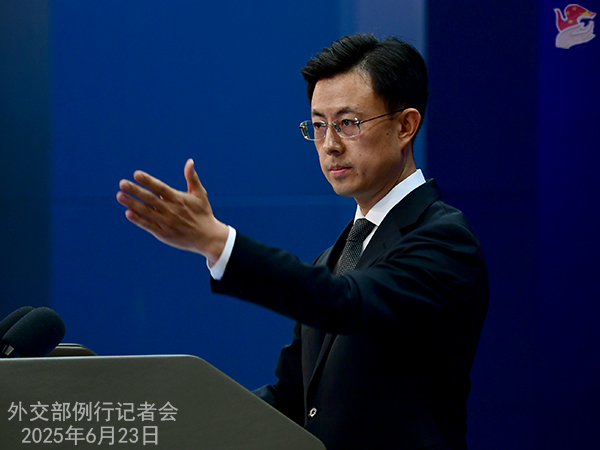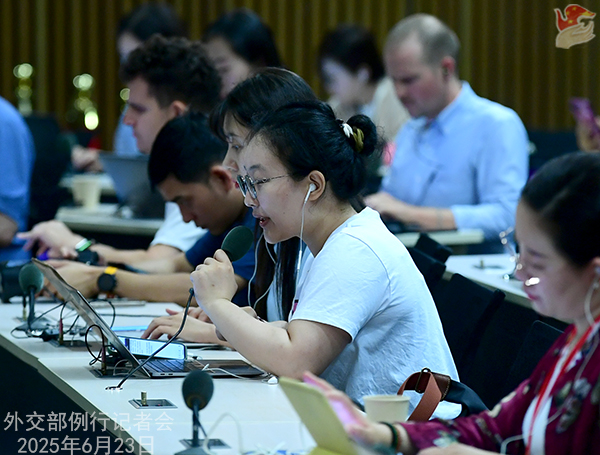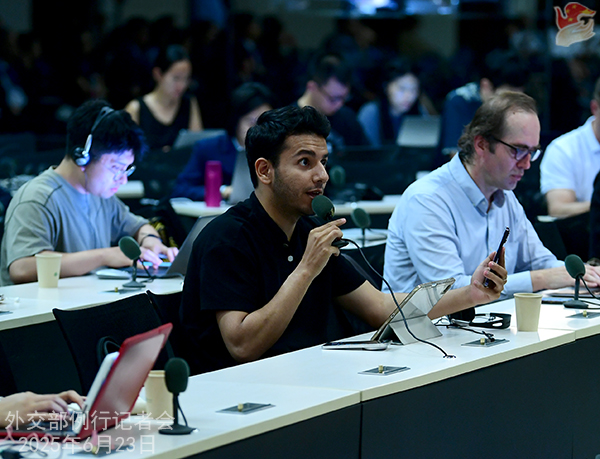
People’s Republic of China


Premier of the State Council Li Qiang will attend the 16th Annual Meeting of the New Champions (AMNC) in Tianjin from June 24 to 25. Premier Li Qiang will attend the Opening Plenary and deliver a special address, meet with foreign guests, and have a conversation with representatives of the foreign business community.
President of Ecuador Daniel Noboa, Prime Minister of Singapore Lawrence Wong, Prime Minister of Kyrgyzstan Adylbek Aleshovich Kasymaliev, Prime Minister of Senegal Ousmane Sonko, and Prime Minister of Viet Nam Pham Minh Chinh will attend the AMNC. Over 1,700 representatives from the political, business, academic and media communities from over 90 countries and regions will also take part in the AMNC.
At the invitation of Member of the Political Bureau of the CPC Central Committee and Minister of Foreign Affairs Wang Yi, Armenia’s Minister of Foreign Affairs Ararat Mirzoyan will pay an official visit to China from June 24 to 27.
CCTV: To follow up on your announcement that Premier Li Qiang will attend the 16th Annual Meeting of the New Champions. What does China expect to achieve through the upcoming event?
Guo Jiakun: The Annual Meeting of the New Champions has so far been successfully held 15 times and become an important platform for promoting exchanges between China and the world and enhancing practical cooperation. Currently, the world economic growth remains anemic, and unilateralism and trade protectionism are on the rise, dealing a heavy blow to multilateral trading system. Against this backdrop, the number of registered participants for this year’s annual meeting reached a new high in recent years, which once again shows the will of all parties in upholding economic globalization and the free trade system as well as their positive attitude toward enhancing economic and trade exchanges and cooperation with China.
We look forward to working with participants from all countries to inject more stability and certainty to the world economy.
China News Service: It’s reported Russia, China and Pakistan have proposed a draft resolution on the situation in Iran to the UN Security Council. Can you brief us on that?
Guo Jiakun: The U.S. attacks on Iran’s nuclear facilities seriously violate the purposes and principles of the UN Charter and have exacerbated tensions in the Middle East. The Security Council cannot stand idly by. China, Russia and Pakistan proposed a draft resolution to the UN Security Council calling for an immediate and unconditional ceasefire, protection of civilians, respect for international law, and engagement in dialogue and negotiation. Together we sent out the message of justice, which reflected the strong call from the international community. We hope that Council members can jointly support the draft resolution and enable the Security Council to play its due role for the maintenance of international peace and security.
Anadolu Agency: Yesterday, you condemned the U.S. attacks on Iran’s nuclear facilities. The world actually witnessed unilateral attack on a sovereign country yesterday and a dangerous precedent of attacking nuclear facilities. What do you make all of this? What is China’s comment on this?
Guo Jiakun: China has made its position clear. Attacking nuclear facilities under the safeguards of the IAEA seriously violates the purposes and principles of the UN Charter and international law. China urges parties to the conflict to prevent the situation from spiraling up, make sure the fighting will not spill over, and return to the track of political settlement. China stands ready to enhance communication and coordination with various parties to pool efforts together and uphold justice, and play a constructive role for restoring peace in the Middle East.

Beijing Youth Daily: We noted that the temporary flight evacuating Chinese nationals from Iran has arrived in China from Turkmenistan recently. Can you share with us the progress in China’s evacuation work from Iran and Israel?
Guo Jiakun: Acting on the decisions and plans of the Party Central Committee, the Ministry of Foreign Affairs, China’s diplomatic and consular missions in Iran and other countries, the Ministry of Transport and the Civil Aviation Administration worked together for the evacuation of 3,125 Chinese nationals from Iran to safety. Among them, there are a 10-month-old baby, a 70-year-old senior, and citizens from Hong Kong and Taiwan. As the Chinese nationals who are willing to leave Iran have all been safely evacuated, the large-scale and well-ordered evacuation of Chinese personnel in Iran has been completed by the Chinese government. At the same time, China’s Embassy in Israel helped and organized the evacuation of over 500 Chinese nationals from Israel to safety, and helped some nationals from the UK, India and Poland safely evacuate.
During the evacuation, countries, including Iran, Azerbaijan, Turkmenistan, Armenia, Türkiye, Iraq, the UAE, Oman, Kuwait, Egypt and Jordan, offered China valuable support. We express sincere appreciation for that.
Still, some Chinese nationals choose to stay in Iran and Israel. Our Ministry reminds them to stay safe. Our colleagues in Chinese diplomatic and consular missions in Iran and Israel have stayed on their post, and will continue to do everything possible to offer Chinese nationals there assistance.
China-Arab TV: Reports say that the Iranian parliament agreed to close the Strait of Hormuz, but the final decision rests with the country’s Supreme National Security Council. What is China’s comment on this? Has the Chinese side spoken with Iran over the phone?
Guo Jiakun: The Persian Gulf and nearby waters are important route for international trade in goods and energy. Keeping the region safe and stable serves the common interests of the international community. China calls on the international community to step up effort to promote deescalation of the conflict, and prevent the regional turmoil from having a greater impact on global economic growth.
China Daily: The China-Bangladesh-Pakistan Vice Foreign Minister/Foreign Secretary meeting was recently held in Kunming, Yunnan. Can you share with us more information?
Guo Jiakun: On June 19, the China-Bangladesh-Pakistan Vice Foreign Minister/Foreign Secretary meeting was held in Kunming, Yunnan. Chinese Vice Foreign Minister Sun Weidong, Bangladesh’s Acting Foreign Secretary Ruhul Alam Siddique, and Pakistan’s Additional Foreign Secretary for Asia-Pacific Imran Ahmed Siddiqui attended the meeting, and Pakistani Foreign Secretary Amna Baloch joined the first phase of the discussions via video link.
Bangladesh and Pakistan are China’s good neighbors, friends and partners. They are also China’s important cooperation partners in high-quality Belt and Road cooperation. As important countries in the Global South and the region, the three countries share the mission to achieve national rejuvenation and modernization. The trilateral cooperation between the three countries is in the interest of their people and conducive to regional peace, stability, development and prosperity.
The meeting was fruitful in four aspects. First, the three sides agreed to work together under the principles of good-neighborliness and friendship, equality and mutual trust, openness and inclusiveness, shared development and mutual benefit, and focus on growing the economy and making people’s lives better. Second, the three sides agreed to discuss and implement cooperation programs in 12 areas, namely industry, trade, maritime affairs, water resources, climate change, agriculture, human resources, think tank, public health, education, culture, and youth. Third, the three sides will establish a working group at the director-general level, and turn the vision for cooperation into reality in a result-oriented way. Fourth, not targeting any third party, the trilateral cooperation upholds true multilateralism and open regionalism, and aims to improve the livelihood of people in this region.

AFP: Just a brief follow-up to the Strait of Hormuz, the U.S. Secretary of State Marco Rubio said on Fox News over the weekend that he also encourages China to help stop Iran from shutting down the Strait. Has China raised or does China plan to raise the issue with Iran? Can the Foreign Ministry share more broadly how China could play a role in mediation or otherwise?
Guo Jiakun: I just answered a question on the Strait of Hormuz.
On the communication between China and Iran, let me stress that our two sides are in communication on the ongoing situation. Recently, Member of the Political Bureau of the CPC Central Committee and Minister of Foreign Affairs Wang Yi has spoken to Iranian Foreign Minister Seyed Abbas Araghchi on the phone. China stands ready to step up communication with Iran and other relevant parties to continue playing a constructive role for a deescalation.
Ukrinform News Agency: Kremlin spokesman Dmitry Peskov said, Russia has no intention of concluding a truce with Ukraine, as it has a strategic advantage in the war. This means that Russia will continue the war, does not seek peace, and is set on escalating war and occupying more Ukrainian territories. Ukraine declared its readiness for a ceasefire more than three months ago, but is forced to defend itself from massive Russian attacks. From Peskov’s statement follows that Russia will ignore all international efforts to end the war. I’d like to ask how the Foreign Ministry can comment on Peskov’s statement and whether it’s appropriate to talk about ceasefire and negotiations if Russia refuses to stop the war if it has an advantage in the battlefield?
Guo Jiakun: On the Ukraine crisis, China’s position is consistent and clear. China always believes that dialogue and negotiation is the only viable way out of the crisis. We hope parties will remain committed to the political settlement of the crisis and work together for deescalation. China stands ready to work with the international community and continue playing a constructive role for resolving the crisis and realizing lasting peace.
Anadolu Agency: Almost half of China’s oil imports are passing through the Hormuz Strait. Do you have any alternative plans if in case of a disruption from the conflict there? Second, you mentioned about a phone call between Mr. Wang Yi and his Iranian counterpart. Was it after the U.S. attacks?
Guo Jiakun: I have answered the question about the Strait of Hormuz just now.
On the communication between China and Iran, after Israel attacked Iran, Member of the Political Bureau of the CPC Central Committee and Minister of Foreign Affairs Wang Yi had a telephone conversation with Iranian Foreign Minister Seyed Abbas Araghchi.
China-Arab TV: It was reported that the Iranian Foreign Minister has arrived in Moscow for a series of talks and he will meet with Russian President Putin on June 23. Will the Iranian Foreign Minister come to China? Can you share relevant information?
Guo Jiakun: I have answered the question about the communication between China and Iran. China stands ready to continue to maintain communication with Iran and play a constructive role for promoting deescalation of the situation.




